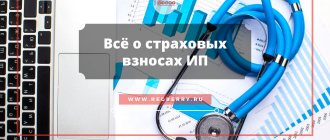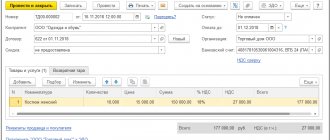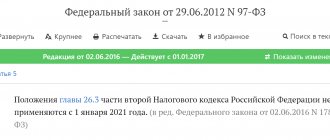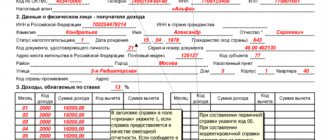VAT for medical products during COVID-19
In accordance with the Decree of the Government of the Russian Federation of April 3, 2020 No. 430, until January 1, 2021, the sale of disposable medical products that are not registered in the Russian Federation, as well as other medical products, the sale of which is subject to VAT at a rate of 10%, is allowed. 3
Letter No. SD-4-3/6930 of the Federal Tax Service of Russia dated April 23, 2021 allows the application of a VAT rate of 10% in relation to medical products that do not have a registration certificate; it will be enough that the product is officially registered in the country of the manufacturer.
What will be the VAT on food in 2021?
In his summer speech, Prime Minister D. Medvedev said that changes in tax legislation will not affect socially significant product groups. Food also falls into this category.
According to the second paragraph of Article 164 of the Tax Code, the VAT rate on food products will not increase in 2021 and, as before, will be 10%. The following are subject to preferential taxation:
- meat and meat products, except raw smoked, dry-cured and stuffed sausages; canned food; smoked meats; baked pork and beef; delicacies (veal, tongue, tenderloin);
- margarine and fats;
- flour and products made from it (pasta, bread, etc.);
- cereals;
- oil, vegetable origin;
- milk and products made from it (including ice cream);
- seasonings: salt and sugar;
- seafood and fish, except gourmet products and valuable fish;
- vegetables;
- baby food;
- products for diabetics.
Also, ten percent is levied on livestock and poultry in live weight, and feed for them (meal, grain, mixed feed, etc.).
- Firmware VAT 20% Mercury 115F
1 000 ₽
1000
https://online-kassa.ru/kupit/proshivka-nds-20-merkurij-115f/
OrderMore detailsIn stock
- Firmware FFD 1.05 Mercury 185F
1 000 ₽
1000
https://online-kassa.ru/kupit/proshivka-ffd-1-05-merkurij-185f/
OrderMore detailsIn stock
- Technical support
1 review
6 000 ₽
6000
https://online-kassa.ru/kupit/tehnicheskoe-soprovozhdenie/
OrderMore detailsIn stock
VAT on providing employees with personal protective equipment
Against the backdrop of the current epidemiological situation, employers were required to provide sanitary services to employees and clients: the availability of antiseptics and disinfectants in crowded areas, the provision of personal protective equipment and other similar products.
Such provision is provided for by the Labor Code of the Russian Federation, recommendations of the Ministry of Health of the Russian Federation and Rospotrebnadzor and is not considered as a gratuitous transfer, therefore, it is not necessary to tax it with value added tax .
What percentage is the optimal tax burden for VAT for 2019-2020?
Tax burden indicators determine the financial condition of the company. To calculate the tax burden, there is a formula, one of the indicators of which is the amount of tax payable.
For more information about the tax burden, as well as the calculation procedure and the values that influence its value, see the material “Tax burden for VAT: what does it depend on and how to calculate?” .
As noted earlier, the tax burden indicator is influenced by various factors. Thus, by adjusting the basic values used to calculate the tax burden, it is possible to increase it or, conversely, decrease it.
When using one or another option for reducing the tax burden, do not forget about the safe share of tax deductions, because exceeding the value of this share will lead to increased attention from the tax authorities. You can evaluate the safety of the VAT deduction share using this material .
VAT rate for book products
Decree of the Government of the Russian Federation of October 9, 2021 No. 1643 expands the list of transactions to which a VAT rate of 10% may be applied:
- book products of an educational, scientific or cultural nature, published in electronic format and distributed via the Internet and satellite communication channels
- books on disks and other media
- e-books
This relaxation does not apply to advertising publications. Advertising information cannot exceed 45% in book products.
New procedure for refund or offset of tax overpayments
The restriction according to which overpayments of taxes can only be offset against taxes of the same type: federal, regional or local has been lifted. The corresponding paragraph of Article 78 of the Tax Code of the Russian Federation “Credit or refund of amounts of overpaid taxes, fees, insurance premiums, penalties, fines” has become invalid. Similar amendments have been made to Article 79 of the Tax Code of the Russian Federation “Return of amounts of excessively collected taxes, fees, insurance contributions, penalties and fines.” Its rules establish that a refund of an overpayment of tax (levy, insurance contribution) to a taxpayer is possible if he does not have arrears for any tax and corresponding penalties and fines.
VAT for IT companies
From January 1, 2021, VAT exemption will be provided only for software that will be included in the Unified Register of Russian Computer Programs and Databases.
This norm is provided for by Federal Law No. 265-FZ of July 31, 2020.
There is no VAT exemption for the implementation of rights to use programs if they allow the distribution of any advertising information about the programs. There is still a VAT exemption for exclusive rights to inventions, know-how, etc.
If, starting next year, programs are purchased from a foreign seller, then VAT taxation will not be avoided. To obtain the right to deduction, the company must make sure that the potential foreign counterparty is registered in the Russian Federation and is a tax payer. At the same time, the documents, agreement or payments must contain information about the Taxpayer Identification Number (TIN), KPP and the VAT amount must be highlighted . In this case, invoices are not provided; information must be reflected in the Purchase Book.
If a foreign partner is not registered in the Russian Federation, then the company cannot act as a tax agent, i.e. should not charge tax on this transaction and claim it as a deduction.
The formation of the Unified Register for Russian IT companies is carried out on the basis of Decree of the Government of the Russian Federation of November 16, 2015 No. 1236.
Rates for tax deduction by the customer during the transitional stage
| Circumstances | Actions this year | Actions next year |
| Receipt of products in the current year, transfer of the amount to the seller next year | Acceptance for deduction of input tax on purchased products at a rate of 18% | Allocation of tax at the rate of 18% in the payment document. The tax amount is calculated at the rate applicable on the date of delivery |
| Transfer of advance payment in the current year, receipt of products next year | Acceptance of tax deduction on advance payment at rate 18/118 | Restoration of advance tax payable at the old rate of 18/118. After receiving the products, accept tax deduction at a rate of 20%. The difference in price due to an increase in the tax rate must be agreed upon in an agreement with the seller |
Features of transportation by sea vessels for VAT purposes
In accordance with Federal Law No. 265-FZ of July 31, 2021, the list of transactions to which the zero VAT rate will be applied has been expanded. Thus, from October 1, 2021, operations involving the transportation of goods by sea vessels from the point of departure on the territory of the Russian Federation to the point of unloading or transshipment for the purpose of further export from the Russian Federation are subject to zero VAT rates.
This law was adopted in connection with the Resolution of the Constitutional Court of the Russian Federation of June 30, 2021 No. 31-P, which dealt with a difficult case when an exporter entered into an agreement with a carrier for the export of goods. During the fulfillment of contractual obligations, the vessel broke down on the territory of the Russian Federation, and therefore the exporter was forced to enter into a new contract with another transport company.
In the case under consideration, the tax inspectors considered that the first carrier company did not have the right to apply a VAT rate of 0% and added an additional amount of tax, referring to the fact that international transportation did not take place.
The judge in his decision supported the taxpayer’s side and considered the use of a zero rate in accounting justified .
Option 3. The contract does not clearly indicate whether the tax amount is included in the price or not.
Sometimes the tax amount is not taken into account in the agreement. In addition, it is often not precisely indicated whether it is included in the contract price or not. In this situation, you need to follow paragraph 17 of the resolution of the Plenum of the Supreme Arbitration Court of May 30, 2014 No. 33. An analysis of the terms of the contract and the features of its preparation, in particular, business messages, is necessary.
Let's assume that VAT is included in the contract price. Let the total cost of the contract, which must be transferred to the supplier, be indicated excluding tax. However, from the terms of the contract and the peculiarities of its preparation, it can be understood that VAT is included in the price of the contract. In such a situation, the allocation of the tax amount by calculation remains with the supplier (clause 17 of the resolution of the Plenum of the Supreme Arbitration Court of May 30, 2014 No. 33).
For example, the price of products under the contract is 118 thousand rubles. Value added tax on advance payment – 18 thousand rubles (118 thousand rubles x 18/118). The tax on shipment is 19,667 rubles (118 thousand rubles x 20/120).
At the same time, if the seller and buyer refuse recalculations, the price of the product will decrease if the tax rate increases. The tax increase will be at the expense of the supplier.
Let's assume that tax is not included in the contract price. Another situation is that the total cost of the contract, which must be transferred to the supplier, is indicated without taking into account tax. However, from the terms of the contract and the peculiarities of its preparation, it can be understood that VAT is not included in the price of the contract. In such a situation, the calculation of tax in excess of the cost and presentation of the tax amount to the customer remains with the supplier (clause 17 of the resolution of the Plenum of the Supreme Arbitration Court of May 30, 2014 No. 33).
In the current year, part of the advance payment was transferred for shipment next year.
It happens that the customer, in the form of an advance payment, transfers only part of the total amount that needs to be paid under the contract. Let’s assume that this year the customer sent the company only part of the advance payment, and next year the products will be shipped and the remaining amount under the contract will be transferred.
In general, the tax consequences will be the same as with a 100% advance in the current year. This year, a tax at the rate of 18/118 must be calculated on the amount of the transferred advance and presented to the customer. As soon as the products are shipped next year, the supplier will accept this VAT for deduction.
In this situation, this year the customer has not yet paid the full amount under the contract, and therefore, if the tax is taken into account (or not taken into account, but is included in the price), you can draw up an additional agreement on the new price and recalculate the lost amounts. If the cost is determined excluding tax, no change in conditions is required.
Due to the increase in the tax rate, the buyer, before the date of shipment, in addition to the advance payment transferred in 2021 for supplies in 2019, can pay the seller 2% VAT .
When receiving an advance payment in the amount of 2% VAT for valuables that will be shipped in 2021, the Federal Tax Service recommends preparing adjustment invoices for the advance payment. If the additional payment was received in 2018, then the rate is 18/118, and if in 2021 - 20/120.
A printed form is provided for the adjustment invoice for the advance payment.
Delivery of products in the current year – calculation next year.
It is necessary to charge tax payable to the state budget on supplies at a rate of 18%. The new VAT rate of 20% cannot be applied to products, work, services or property rights that were shipped or completed before 01/01/19. (clause 4 of Article 5 of Law No. 303-FZ dated August 3, 2021, letters of the Ministry of Finance dated August 6, 2021 No. 03-07-05/55290, dated August 1, 2021 No. 03-07-11/53970).
VAT declaration
Starting with reporting for the fourth quarter of 2021, which must be submitted to the tax office before January 25, new requirements will be imposed on the procedure for filling out a VAT return (see more details New forms of VAT and property tax returns)
In 2021, we should expect new changes when filling out the declaration; this will be related to the introduction of a mechanism for traceability of imported goods.
It is planned that the changes will affect reporting starting from the third quarter of 2021 .
New invoice details
As of July 1, 2021, amendments will come into effect regulating the traceability system for imported goods . This system is being created to confirm the legality of the circulation of goods in the EAEU, prevent the import of counterfeit products into the territory of the Russian Federation, increase the competitiveness of domestic goods, and reduce gray imports.
The Government of the Russian Federation will establish a list of goods, the sale of which will fall under the tracking system. A procedure for providing information to the tax office will also be developed.
When selling traceable goods, it will be necessary to issue invoices, including adjustment ones, in electronic form.
Exceptions are provided:
- sale of goods to self-employed citizens, as well as individuals for personal, family, household and other needs not related to business activities;
- re-export;
- sale and movement of goods from the Russian Federation to the territory of another EAEU state.
To do this, new details will be added to the invoice form:
- registration number of the batch of goods subject to traceability;
- a quantitative unit of measurement of a product that is used for traceability purposes;
- quantity of traceable goods.
At the same time, the absence (failure to indicate) of these details in the invoice will not entail a refusal to deduct VAT from the buyer.
What is not subject to value added tax
Transactions not subject to value added tax include the following:
- Not recognized as sales of goods, works, services in accordance with clause 3 of Art. 39 Tax Code of the Russian Federation;
- For the free transfer of residential buildings, kindergartens, clubs, sanatoriums and other social, cultural, housing and communal facilities, as well as roads, electrical networks, substations and other similar facilities to state authorities and local governments;
- On the transfer of property of state and municipal enterprises purchased through privatization;
- For leasing premises to foreign citizens and companies accredited in the Russian Federation;
- For the sale of certain types of goods and the provision of certain services named in clause 2 of Art. 149 Tax Code of the Russian Federation;
- For the performance of work or provision of services by bodies included in the system of state authorities and local self-government, within the framework of the powers assigned to them, provided that the obligation to perform these works and services is established by the current legislation of the Russian Federation;
- For the performance of work and provision of services by state, budget and autonomous within the framework of a state or municipal assignment, the source of financial support of which is a subsidy from the corresponding budget of the budget system of the Russian Federation;
- For the transfer on a gratuitous basis or for free use of fixed assets to state authorities and local governments, state and municipal institutions, as well as state and municipal unitary enterprises;
- For the sale of land plots and shares in them;
- On the transfer of the company’s property rights to its legal successor(s);
- For the transfer of funds or real estate for the formation or replenishment of the target capital of a non-profit organization.
Tax payment deadlines
VAT is calculated and paid to the budget quarterly. The tax for the past month is paid in stages, not in a single amount (although this is also possible), but in three installments over the next three months. The payment deadline is no later than the 25th of each month.
Let’s say VAT payable for the 1st quarter amounted to 120,000 rubles. It must be paid either in full or at least 1/3 every month (40,000 rubles every month):
- Until April 25 – 40,000 rubles. (1/3 of 120,000 rub.);
- Until May 25 – 40,000 rubles;
- Until June 25 – 40,000 rubles.
Note: that is, in fact, VAT is paid every month.








